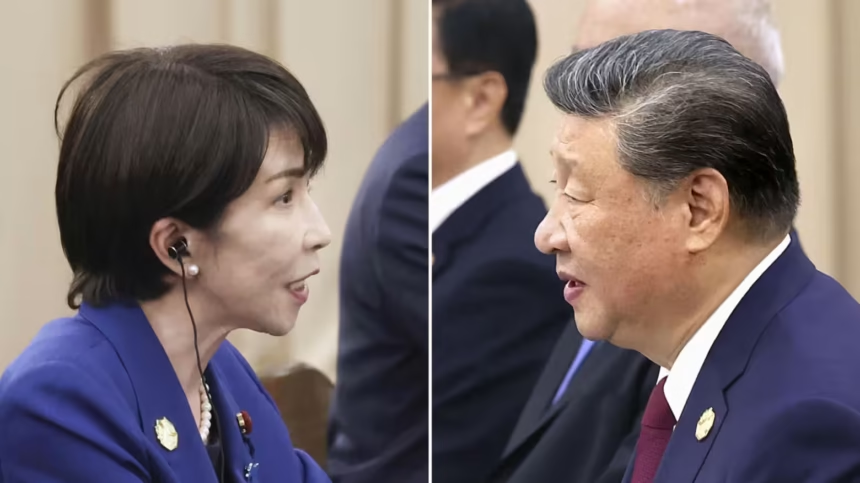The delicate and often fraught relationship between China and Japan has plummeted into its most severe crisis in years, triggered by explosive comments from Japan’s new Prime Minister, Sanae Takaichi, regarding a potential conflict over Taiwan. The diplomatic storm began brewing on Friday, November 7, 2025, when Premier Takaichi, a known conservative hawk, stated during a parliamentary session that an armed attack on Taiwan could be classified as a “survival-threatening situation” for Japan. This phrase is key to Japan’s 2015 security legislation, which legally permits the Japan Self-Defense Forces (JSDF) to exercise the right to collective self-defense and potentially intervene militarily to aid an ally.
Beijing, which views Taiwan as an inseparable part of its territory, immediately condemned the remarks, seeing them as a dangerous and explicit threat of foreign interference in a core domestic matter. China views Takaichi’s statement as a radical departure from Japan’s long-standing policy of “strategic ambiguity” on the Taiwan issue, arguing that Tokyo is now openly attempting to normalize a path for its military involvement. The Chinese Foreign Ministry quickly denounced the comments as “erroneous and provocative” and demanded Tokyo “retract the unjustified remarks” or “bear the consequences.”
Escalation from Words to Action: The Diplomatic and Economic Blows
The tension spiraled rapidly over the following week, moving from diplomatic protests to concrete measures with economic consequences. On Thursday, November 13, China’s Vice Foreign Minister Sun Weidong summoned Japanese Ambassador Kenji Kanasugi to lodge a strong protest, stating that Takaichi’s comments “seriously damaged bilateral ties” and warning that “If Japan dares to attempt an armed intervention in the Taiwan Strait situation, it would be an act of aggression and definitely meet a firm response from China.”
The rhetoric grew even more inflammatory when the Chinese Consul General in Osaka, Xue Jian, took to social media and shared an article referencing Takaichi’s comments, adding the shocking comment: “We have no choice but cut off that dirty neck that has been lunged at us without hesitation.” Although the post was quickly removed, Japan’s Chief Cabinet Secretary, Minoru Kihara, lodged an immediate formal protest, demanding Beijing take “appropriate measures” against the diplomat for the “extremely inappropriate” remarks.
The most significant retaliatory move came late on Friday, November 14, when the Chinese embassy in Japan issued a sharp travel advisory, urging its citizens to “avoid traveling to Japan in the near future.” The advisory claimed the leader’s remarks had “severely damaged the atmosphere for people-to-people exchanges” and posed “significant risks to the personal safety and lives of Chinese citizens in Japan.” This move hits Japan’s economy directly, as Chinese travelers accounted for the highest number of foreign visitors between January and September of this year.
In a direct follow-up on Saturday, November 15, China’s largest carriers—Air China, China Southern, and China Eastern—announced they would offer full refunds or free itinerary changes for Japan-bound flights through the end of the year, further cementing the economic impact of the diplomatic row. Japan’s government responded to the travel warning on Saturday, with Chief Cabinet Secretary Kihara criticizing the advisory as being “inconsistent with the promotion of a strategic and mutually beneficial relationship.”
Despite the overwhelming international backlash and the rising tensions, Prime Minister Takaichi has remained resolute. She insisted on Monday, November 10, that she had “no intention of retracting” her statement, arguing it was based on the “worst-case scenario” and was consistent with the legal framework established in 2015. However, she indicated she would exercise caution in referring to specific scenarios in the future.
The current situation represents a dangerous crossroads. For China, Taiwan is an “untouchable red line” and a matter of “national reunification,” with state media warning that Takaichi’s stance is the first time a Japanese leader has “issued a military threat against China” in 80 years. For Japan, the stability of the Taiwan Strait is viewed through a lens of national survival due to its proximity to the Japanese islands and the vital sea lanes that pass through the area.
With no sign of either side backing down, the world is now watching to see if dialogue can prevail. The escalating military rhetoric, coupled with the economic penalty of the travel advisory, has raised fears that the delicate balance of power in the Indo-Pacific region could be tipping toward open confrontation.











